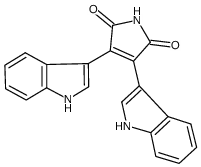All AbMole products are for research use only, cannot be used for human consumption.

Arcyriarubin A is a cell permeable protein kinase C (PKC) inhibitor. Arcyriarubin A inhibits also protein kinase A (PKA). Bisindolylmaleimide IV (Arcyriarubin A) is a potent, selective inhibitor of human cytomegalovirus (HCMV) replication in cell culture with an IC50 of 0.2 μM.
| Molecular Weight | 327.34 |
| Formula | C20H13N3O2 |
| CAS Number | 119139-23-0 |
| Solubility (25°C) | DMSO 75 mg/mL |
| Storage | Powder -20°C |
[5] Min Huang, et al. Inhibition of nucleoside transport by protein kinase inhibitors
| Related PKC Products |
|---|
| Sapintoxin D
Sapintoxin D is a fluorescent phorbol ester that can be used to study the activation of protein kinase C (PKC). |
| Bryostatin 3
Bryostatin 3, a macrocyclic lactone, is a protein kinase C activator, with a Ki of 2.75 nM. |
| Ruboxistaurin mesylate
Ruboxistaurin (LY333531) mesylate is an orally active, selective and ATP competitive PKCβ inhibitor with IC50 values of 4.7 and 5.9 nM for PKCβI and PKCβII, respectively. |
| PKC β pseudosubstrate
PKC β pseudosubstrate is a selective cell-permeable inhibitor of PKC. |
| Protein Kinase C (19-31)
Protein Kinase C (19-31), a peptide inhibitor of protein kinase C (PKC), is used as protein kinase C substrate peptide for testing the protein kinase C activity. |
All AbMole products are for research use only, cannot be used for human consumption or veterinary use. We do not provide products or services to individuals. Please comply with the intended use and do not use AbMole products for any other purpose.


Products are for research use only. Not for human use. We do not sell to patients.
© Copyright 2010-2024 AbMole BioScience. All Rights Reserved.
